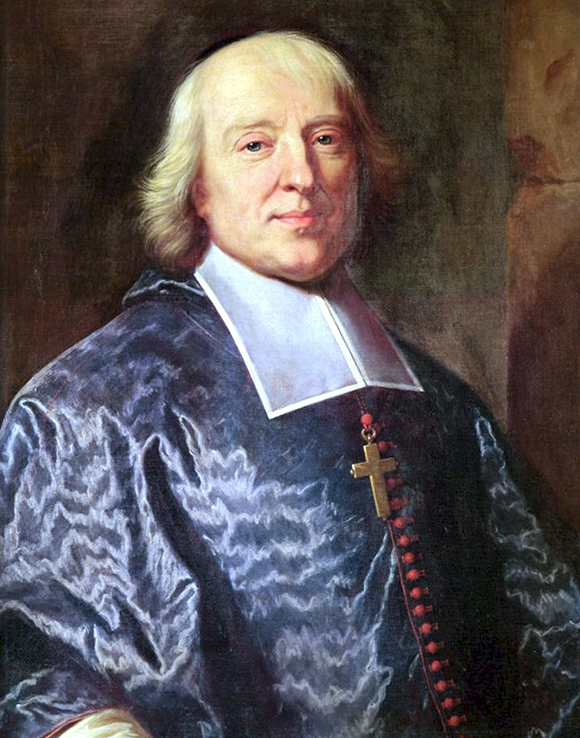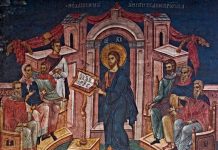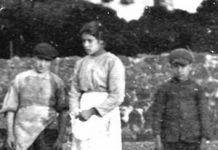Jacques Bénigne Bossuet (1627-1704), bishop of Meaux, lived in a time shortly after the Reformation. A bishop of much lustre, Bossuet frequented Versailles, preaching before court and king, was tutor to the Dauphin, and even held correspondence with such a philosophical giant as Leibniz for a time. His oratorical skills have been ranked ahead of even one so great as Chrysostom, and he authored the Discourse on Universal History, a work hailed as the sequel to Augustine’s City of God. Looked up to by such vitriolic atheists as Voltaire and ultramontanes like de Maistre, Bossuet was a pillar of French intellectual culture. So much so, in fact, that it is a rare event to find his name mentioned in the literature of the age without seeing words such as ‘the illustrious’ or ‘the immortal’ before it.
In addition to his Universal History, Bossuet wrote numerous other works, one among them being his formidable anti-Protestant polemic, History of the Variations of the Protestant Churches. As the title gives away, the book consists in chronicling the many variations in Protestant doctrines that have occurred since the breakout of the Reformation. Change equals heresy, at least for Bossuet; thus, to show the changes in the various Protestant communions was equivalent to revealing their falsity. The true faith, like God, was unchangeable.
This work – although justly still hailed as a masterpiece – is generally now seen as irrelevant to current Catholic-Protestant dialogue. This is due to the ubiquitous acceptance of Newman’s idea of doctrinal development in Catholic circles. But whether this dismissal of the work is justified or not – and I am inclined to think the latter – it is undeniable that the argument found in it is a well-known one. This being the case, I have chosen to select a more obscure work of his – A Conference on the Authority of the Church – to bring into the light and elucidate a little-known argument against Protestantism that is contain therein.
Gathering at the behest of the scion Mademoiselle de Duras, Bossuet and M. Claude, a Calvinist, met to debate on matters religious. And it is in A Conference on the Authority of the Church in which Bossuet recollects this debate. Throughout the course of the conference, divers arguments are employed, and it would be too much to reproduce them all here. But one stands out as unique above all the others: his argument based on baptism.
Moving on from a discussion of early Church history, Bossuet brings up the perennial question of how the Protestant is able to determine the canon of Scripture without accepting the authority of the Catholic Church. This is an argument well-worn in Catholic apologetics, and has nothing especially unique about it. But what is unique is the depth to which Bossuet gives to it.
With both combatants accepting the premise that baptism infuses faith into the newly christened member of the Church, the debate ensues with a question from Bossuet: is “a believer, at his first receiving the Holy Scripture from the Church… obliged to doubt, and then to examine whether the book she put into his hand were verily inspired by God or not?” Bossuet knows that belief in the Scriptures is essential to the Protestant conception of faith, so he decides to prod there. The question leaves the Protestant in a dilemma: either they answer in the affirmative, from which it follows that the person in question “renounces his faith, and begins the reading of the gospel by an act of infidelity,” or they answer in the negative, meaning that the person “receives then, without examining, the authority of the Church which presents him the gospel.”
Claude, in response to this, takes on the first horn of the dilemma, admitting that the newly baptized person – who has never heard of or read Scripture – is not in a position to pronounce his faith in its divine authorship. But in order to show that it doesn’t follow from this that the person in question would be an apostate, he tries to argue that they would not – in this case – technically be in a state of doubt. Rather, the person is simply ignorant. To use M. Claude’s own analogy, take the case of a person unskilled in diamonds. If asked whether a certain diamond be good or bad, it is clear that this person would not be actively doubting whether or not the diamond is good, but would merely be in a state of ignorance. Yet Bossuet refuses to accept such an argument, stating that doubt – by definition – is not to know whether a thing be or not. Thus a Christian who knows not whether the Scripture be true is in doubt upon the point.
Moreover, Bossuet even seems to willing to accept the validity of what M. Claude says on this for the sake of argument, and goes on to show that this still doesn’t lessen the force of what he is trying to say. Baptism imparts the gift of faith upon the recipient – and because of this, it would seem that, if baptism failed to produce said effect, then it would be a lie. Yet this is exactly the case for the Protestant. Why? Because the church they belong to – whether it be the Calvinist church of M. Claude, a Lutheran church, or any other Church that claims its heritage from the Reformation – refuses to claim infallibility in their dogmatic declarations; and since not infallible, argues Bossuet, its claim to be proposing the correct canon of books inspired by God cannot claim the certainty that is proper to divine faith. Thus, the newly christened person who had never heard of the Scriptures would not be in a position to accept the them as inspired by God until he had examined the writings for himself – something which M. Claude admits. Bossuet aptly remarks how “this is an awful evil, that a believer cannot make so essential an act of faith.”
The nub of the whole argument comes down to what external means the Holy Ghost uses in bringing souls to believe in the Scriptures. The answer of the Catholic, per Bossuet, is to be found in the Creed; wherein – immediately after the Holy Ghost is mentioned – the belief in the Church is confessed. Yet if things stood as M. Claude would like to think, one would expect the Scriptures to follow upon the belief in the Holy Ghost – but this is not the case. Rather, the Church is proposed as the more primordial act of faith. As Bossuet puts it, “there is no mention made to him of the Scripture, but believing in the Universal Church is proposed to him as soon as believing in the Holy Ghost… he who believes in the Holy Ghost necessarily also believes the universal Church which the Holy Ghost directs.” Thus the Church is – following the logic of the Creed – the “outward means whereby the Holy Ghost insinuates the belief of the Holy Scripture into the heart” – a sentiment close to Bossuet’s theological hero, Augustine. For, as that illustrious bishop of Hippo once said: “for my part, I should not believe the gospel except as moved by the authority of the Catholic Church.”
As the argument progresses, Bossuet even participates in a little satire of M. Claude’s position. Imagining the case of a Calvinist trying to figure out how instruct a newly baptized person, he says that they must teach him as they would an infidel: “Here is the Scripture, which I believe inspired by God; read it, child; examine it; see, whether it be the very truth or a fable. The Church believes it inspired by God, but the Church may be deceived, and thou are not in a condition to make with her this act of faith.” An absurdity much. And, as Bossuet goes on to argue, the only way to avoid this is for the person to work from the premise that the Church is not mistaken in handing on to them this Scripture. Yet M. Claude does have a good point to make in reply: namely, wouldn’t this make everyone conclude in favor of his own Church?
In response, Bossuet is willing to admit that this is the strongest objection which could be made against his argument. As he recalls, he now spoke “with trembling, seeing it concerned the salvation of a soul; and I besought God, who made me see the truth so clearly, that he would give me words to set it forth distinctly: for I have to do with a man, who heard patiently, spoke clearly and strongly, and, in fine, pushed difficulties to the utmost points.”
As to his actual reply, he starts by making the point that at least the ancient churches – those of the Greeks, Armenians, etc. – actually claim that the true Church, “wheresoever she is, must be believed, and that she never deceives her children,” while M. Claude’s Reformed church won’t even have one believe the true Church itself. Thus, the Protestant system is ruled out regardless.
Second off, following in the tradition of the scholastics, Bossuet is sure to make his distinctions before proceeding any further in his response. He does this by clearly demarcating between the realms of divine faith and human prejudice. Of the former comes a belief in the Universal Church, spread throughout the world, proclaiming the evangel of Christ. But this belief, infused into the heart by baptism, doesn’t determine what specific church one will actually belong to. Going off the point of M. Claude, Bossuet acknowledges that many churches exist which claim to be the one true infallible Church instituted by Christ. Yet which church one decides to become a member of is a matter heavily influenced by human prejudice – not the divine faith which inspires a belief in the Universal Church. Therefore, divine faith is the cause behind a belief in the general idea of a Universal Church, which is infallible in its pronouncements and to which is owed submission, but the particular church chosen is a matter of human prejudice. The fact that most people will chose to remain in the church of their youth doesn’t tell against the fact that the Holy Spirit infuses in us a belief in the Universal Church, as M. Claude likes to think it does. As Bossuet put it, there is “an everlasting difference between that which the Holy Ghost puts in the hearts of the baptized, when he interiorly disposes them to believe the true Church, and that which human prejudices have added to it, by bringing their mind to adhere to a false one.” Such prejudices could range from upbringing to the influence of pastors. And if one happens to be born in the wrong church, there will be a “grievous temptation” to remain in the church of one’s youth, along with the subsequent “awful difficulty” to “distinguish what is from God, in the faith of their Church, from that which is from men.” It is from this reason that Bossuet exclaims: “Happy are those whose human prejudices are arrayed on the side of the true belief which the Holy Ghost puts in their hearts!”
As to how one might distinguish what comes from God and what comes from human prejudice, Bossuet brushes this issue aside as not pertinent to the discussion at hand. A bit of a cop-out. Yet, if I had to guess what Bossuet would say if he were to have given an answer, he would have most likely pointed out that there are multitudinous reasons – marks of the true Church – which, from purity of its doctrine to the holiness of its inhabitants, display that the Roman communion is the true communion. In addition, he would have adduced other reasons drawn from the testimony of the Scriptures and the writings of the Fathers to further his point. Thus the person who happened to be born in the wrong church would be left with no excuse in failing to convert.
Shortly after, the conference came to a close, with M. Claude remaining firm in his Reformed positions. But not all was lost. The person for whom the conference was convoked for, Mademoiselle de Duras, eventually converted to Catholicism, leaving her former Reformed faith behind. And, with any luck – maybe, just maybe – the writings of Bossuet could do the same for others today.










